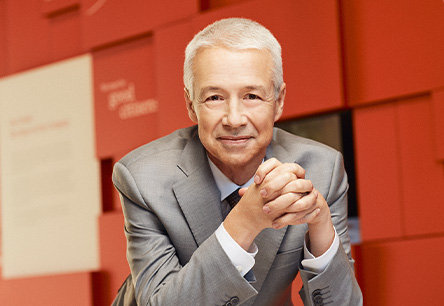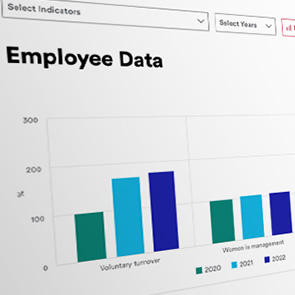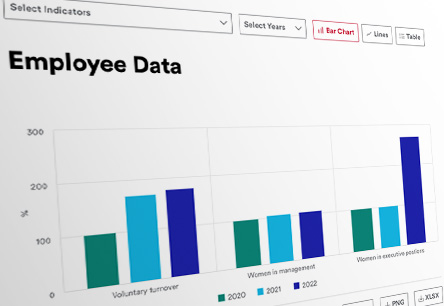The Company’s dedication to integrating ESG into our business strategies starts at the highest levels of leadership, where the Board has overall accountability for ESG risk management oversight.
Effective ESG governance requires both management engagement and Board level oversight. The Board’s ESG risk management approach is designed to effectively govern and manage the ESG risks and opportunities that are integral to the Company’s core business strategy. Significant ESG risks are reviewed and evaluated by the Board and its Committees as part of their ongoing risk oversight of our Company.
In 2022, we improved ESG governance matters in the following ways:
- We announced our evolved ESG strategy, focused on championing global health equity, empowering our employees and advancing environmental health. Leading with accountability and innovation is foundational to these efforts.
- The Enterprise Governance Council, the Company’s primary governance body for ESG matters, updated its ESG knowledge module and made it available to all employees to help them understand our ESG management approach, including our ESG strategy.
- We held our fifth investor relations ESG webcast in June 2022, to update shareholders on our ESG performance and progress against our Health for Humanity 2025 Goals. The webcast included an interview with members of the Johnson & Johnson Board of Directors and our Chief Financial Officer.
- We continued to improve our disclosures on ESG topics, including enhancing our Tax Policy, Position on Disaster Relief and Position on Employee Development. We also expanded disclosures with additional metrics for greater transparency.
ESG Priorities
At Johnson & Johnson, we use our materiality assessment, which we call our Priority Topics Assessment (PTA), to identify, prioritize and strategically address relevant ESG topics that can have a significant impact on society or our business. Since 2008, we have conducted the PTA every two to three years. Our last PTA was conducted in 2021 with a double materiality focus, by which we examined ESG priority topics from two standpoints: the impact of a topic on Johnson & Johnson’s business results and the impact of Johnson & Johnson’s business on people, the environment and society in general. Our Priority Topics Matrix presents our ESG priorities.
ESG Strategy
Our ESG strategy is grounded in Our Credo values, informed by both our Company’s purpose to change the trajectory of health for humanity and the views of our external stakeholders. We set our ESG strategy in a deliberate manner, focusing our efforts on the areas where we are well positioned to achieve the greatest impact: championing global health equity, empowering our employees and advancing environmental health. Leading with accountability and innovation is foundational to these efforts. Our ESG approach is designed to effectively govern and manage all risks, including ESG risks, while also enabling us to identify opportunities that accurately reflect our business strategy. This sustained, focused approach promotes resiliency and drives growth, better positioning us to continue investing for our future and enhancing the long-term value of our business.
Our Credo
Our Purpose
We blend heart, science and ingenuity to profoundly change the trajectory of health for humanity.
ESG FOCUS AREAS
Champion global health equity
Foster better health for people, communities and planet, improving access and affordability around the world.
Empower our employees
Cultivate a workforce that is healthy, inspired and reflective of those we serve.
Advance environmental health
Protect environmental health and the resilience of our business.
Lead with accountability and innovation
Commitment to science and data-driven decision making, compliance, integrity and responsible business practices across the value chain.
For more information on how we help our stakeholders understand how we are managing the risk of these relevant ESG topics and embedding sustainability into decision making, which is a critical component of our ESG governance, please see our ESG Strategy and our ESG Resources.
Stakeholder Engagement
The deep and longstanding relationships we cultivate with our stakeholders are vital to our business success and our ESG strategy. Johnson & Johnson interacts with numerous stakeholder groups at the global, national and local levels, including through membership of, and participation in, a broad range of advocacy organizations and industry associations.
In 2022, our targeted engagement activities included:
Promoting health legislation in the U.S.
The U.S. maternal mortality rate continues to exceed the rate of other high-income countries, including a 40% increase in 2021.5 In the U.S., Medicaid has a vital role to play in improving maternal health outcomes, with nearly half of all births financed by Medicaid. We strongly supported state efforts to advance legislation to extend Medicaid postpartum coverage to 12 months for new mothers, helping address disproportionate maternal mortality outcomes in disadvantaged communities.
Johnson & Johnson also joined more than 70 healthcare organizations in advocating for the Dr. Lorna Breen Health Care Provider Protection Act (H.R. 1667), the first ever federal legislation in the U.S. directed at protecting the mental health of the country’s healthcare workforce to facilitate the reduction and prevention of suicide, burnout and mental and behavioral health conditions among HCPs. The Act became law in March 2022.
While health worker burnout had reached a crisis point before the COVID-19 pandemic, the acute mental health needs and risk factors among HCPs were brought into sharp focus in the early days of 2020 as health workers experienced severe work trauma, burnout, and exhaustion. The tragic death by suicide of emergency room physician, Dr. Lorna Breen, in April 2020, underscored the urgent need to provide better support services to health workers. In July 2020, Senator Tim Kaine (D-VA) introduced a bill to protect the mental health of the healthcare workforce. Developed alongside the Dr. Lorna Breen Heroes’ Foundation with support from Johnson & Johnson, this bill would eventually become the Dr. Lorna Breen Healthcare Provider Protection Act.
Supporting healthcare policy making in Europe
As the founding knowledge partner and sponsor of All Policies for a Healthy Europe Coalition, we strengthened our partnership on the development of numerous publications and policy dialogues by the coalition in three areas: the economy of well-being (covering the COVID-19 pandemic response, health systems resilience, value-based healthcare and the EU Beating Cancer policies); the digitalization of health (contributing our expertise to emerging data governance, the European Health Data Space and AI policies); and environmental health (supporting the revision of the ambient air directive).
Janssen has been a leading industry voice shaping the EU Pharmaceutical Strategy, championing patient access to medicines and strong IP rights. We have shone a light on the changes in EU legislation that would diminish IP rights, a critical element underpinning medical innovation in Europe. Janssen provides evidence and data to help stakeholders appreciate the need for strong IP protections to develop new treatments to address unmet medical needs. We also advocate for an agile regulatory framework that will allow fast adoption of innovative new medicines supported through the use of real-world evidence, digital health technology and data sharing. Our activities in 2022 included direct dialogue with European policymakers and other stakeholders, along with yearlong media engagement, adding our voice to the public debate.
Dirk de Smaele
Global Head and Vice President, Therapeutics Development & Supply, Janssen
Strengthening the healthcare industry in Asia
Johnson & Johnson led the healthcare industry presence at the 2022 Asia Pacific Economic Cooperation (APEC) Leaders’ Week in Bangkok, Thailand, as the only healthcare company speaking at the event. APEC is a critical and highly influential forum, driving improvements in healthcare policy, innovation and access across this large and diverse region of the world. The Leader’s Week was the first in-person APEC gathering since 2018 and a significant opportunity for our global delegation to engage with heads of state and government leaders from all 21 APEC countries, industry and academia. We shared Johnson & Johnson’s perspective on key healthcare challenges and the importance of advancing quality health data, health financing for innovation and supply chain resilience to improve healthcare outcomes.
Participating in global convenings to advance healthcare systems
Leaders from across Johnson & Johnson participated in several key events and meetings during the UN General Assembly in 2022. Our engagement emphasized the importance of advancing equitable access to care, investing in health workers and innovation to eradicate pandemic and epidemic diseases, and pandemic response.
Also in 2022, global health leaders and stakeholders gathered in Geneva, Switzerland, for the 75th annual World Health Assembly (WHA), with representation of 194 country delegations. The WHA provides an important opportunity for partners across sectors to engage, build and strengthen relationships and to accelerate action on pressing health challenges facing the world. As a global healthcare leader, Johnson & Johnson was an active convenor and contributor to events during the WHA, providing a critical private sector lens and bringing greater awareness of our unique lab-to-last-mile approach to advancing equitable access to care. Our engagement covered key issues, including vaccination to eradicate disease such as Ebola, fighting infectious diseases like TB and supporting frontline health workers. Also, at WHA 2022, Johnson & Johnson announced our new Global Surgery Initiative and joined discussions on the importance of investing in sustainable surgical systems to advance equitable access to care.
Engaging with industry on ESG
We continued to engage with the pharmaceutical industry to ensure the expertise of our industry is reflected in the ESG metrics and related disclosures that are most relevant to the sector. Working as part of the Biopharma Sustainability Roundtable (BSRT), a network that supports sustainability in the biotech and pharmaceutical industry, Johnson & Johnson participates in the Biopharma Investor ESG Communications Initiative, which supports the development of decision-useful communications about the sector’s most important ESG issues. In 2022, BSRT released the Biopharma Investor ESG Communications Guidance 4.0, the result of collaboration among leading pharmaceutical companies, including Johnson & Johnson, as well as investor groups.
Monica Neufang
Vice President, Enterprise ESG Program Office, Johnson & Johnson, member of the Biopharma Investor ESG Communications Initiative Working Group
Engaging stakeholders for this Report
Many internal stakeholders across Johnson & Johnson’s global teams provided input for this Report. The Chairman of the Board and CEO, the Disclosure Committee and the Disclosure Sub-Committee6 reviewed the Report outline and metrics, and the Disclosure Committee reviewed the full Report. Our entire Executive Committee reviewed and approved the 2022 Health for Humanity Report, and it was shared with the Regulatory Compliance & Sustainability Committee of the Board of Directors and the full Board prior to publication.
6 The Disclosure Sub-Committee comprises the Corporate Secretary and leaders from the Controllers’ office and Treasury and Investor Relations departments. The Disclosure Committee comprises the Chief Financial Officer, General Counsel, Corporate Secretary, Head of Litigation plus leaders from the Controllers' office and Investor Relations and Global Audit & Assurance departments.








